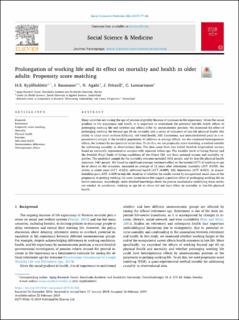Please use this identifier to cite or link to this item:
https://doi.org/10.21256/zhaw-4796| Publication type: | Article in scientific journal |
| Type of review: | Peer review (publication) |
| Title: | Prolongation of working life and its effect on mortality and health in older adults : propensity score matching |
| Authors: | Eyjólfsdóttir, Harpa Sif Baumann, Isabel Agahi, Neda Fritzell, Johan Lennartsson, Carin |
| DOI: | 10.21256/zhaw-4796 10.1016/j.socscimed.2019.02.026 |
| Published in: | Social Science & Medicine |
| Volume(Issue): | 226 |
| Page(s): | 77 |
| Pages to: | 86 |
| Issue Date: | 2019 |
| Publisher / Ed. Institution: | Elsevier |
| ISSN: | 1873-5347 0277-9536 |
| Language: | English |
| Subjects: | Retirement; Propensity score matching; Mortality; Physical health; Pensions; Self-rated health; Socioeconomic differences; Heterogeneous effects |
| Subject (DDC): | 362: Health and social services |
| Abstract: | Many countries are raising the age of pension eligibility because of increases in life expectancy. Given the social gradient in life expectancy and health, it is important to understand the potential late-life health effects of prolonging working life and whether any effects differ by socioeconomic position. We examined the effect of prolonging working life beyond age 65 on mortality and a series of indicators of late-life physical health (the ability to climb stairs without difficulty, self-rated health, ADL limitations, and musculoskeletal pain) in a representative sample of the Swedish population. In addition to average effects, we also examined heterogeneous effects, for instance by occupational social class. To do this, we use propensity score matching, a method suitable for addressing causality in observational data. The data came from two linked Swedish longitudinal surveys based on nationally representative samples with repeated follow-ups; The Swedish Level of Living Survey and the Swedish Panel Study of Living conditions of the Oldest Old, and from national income and mortality registries. The analytical sample for the mortality outcome included 1852 people, and for late-life physical health outcomes 1461 people. We found no significant average treatment effect on the treated (ATT) of working to age 66 or above on the outcomes, measured an average of 12 years after retirement: mortality (ATT -0.039), the ability to climb stairs (ATT -0.023), self-rated health (ATT -0.009), ADL limitations (ATT -0.023), or musculoskeletal pain (ATT -0.009) in late life. Analyses of whether the results varied by occupational social class or the propensity to prolong working life were inconclusive but suggest a positive effect of prolonging working life on health outcomes. Accordingly, more detailed knowledge about the precise mechanisms underlying these results are needed. In conclusion, working to age 66 or above did not have effect on mortality or late-life physical health. |
| URI: | https://digitalcollection.zhaw.ch/handle/11475/15949 |
| Fulltext version: | Published version |
| License (according to publishing contract): | CC BY-NC-ND 4.0: Attribution - Non commercial - No derivatives 4.0 International |
| Departement: | School of Health Sciences |
| Organisational Unit: | Institute of Public Health (IPH) |
| Published as part of the ZHAW project: | Die gesundheitlichen Auswirkungen einer späteren Pensionierung |
| Appears in collections: | Publikationen Gesundheit |
Files in This Item:
| File | Description | Size | Format | |
|---|---|---|---|---|
| 2019_Prolongation_of_working_life_and_its_effect_on_mortality_and_health.pdf | 4.22 MB | Adobe PDF |  View/Open |
Show full item record
Eyjólfsdóttir, H. S., Baumann, I., Agahi, N., Fritzell, J., & Lennartsson, C. (2019). Prolongation of working life and its effect on mortality and health in older adults : propensity score matching. Social Science & Medicine, 226, 77–86. https://doi.org/10.21256/zhaw-4796
Eyjólfsdóttir, H.S. et al. (2019) ‘Prolongation of working life and its effect on mortality and health in older adults : propensity score matching’, Social Science & Medicine, 226, pp. 77–86. Available at: https://doi.org/10.21256/zhaw-4796.
H. S. Eyjólfsdóttir, I. Baumann, N. Agahi, J. Fritzell, and C. Lennartsson, “Prolongation of working life and its effect on mortality and health in older adults : propensity score matching,” Social Science & Medicine, vol. 226, pp. 77–86, 2019, doi: 10.21256/zhaw-4796.
EYJÓLFSDÓTTIR, Harpa Sif, Isabel BAUMANN, Neda AGAHI, Johan FRITZELL und Carin LENNARTSSON, 2019. Prolongation of working life and its effect on mortality and health in older adults : propensity score matching. Social Science & Medicine. 2019. Bd. 226, S. 77–86. DOI 10.21256/zhaw-4796
Eyjólfsdóttir, Harpa Sif, Isabel Baumann, Neda Agahi, Johan Fritzell, and Carin Lennartsson. 2019. “Prolongation of Working Life and Its Effect on Mortality and Health in Older Adults : Propensity Score Matching.” Social Science & Medicine 226: 77–86. https://doi.org/10.21256/zhaw-4796.
Eyjólfsdóttir, Harpa Sif, et al. “Prolongation of Working Life and Its Effect on Mortality and Health in Older Adults : Propensity Score Matching.” Social Science & Medicine, vol. 226, 2019, pp. 77–86, https://doi.org/10.21256/zhaw-4796.
Items in DSpace are protected by copyright, with all rights reserved, unless otherwise indicated.